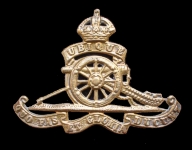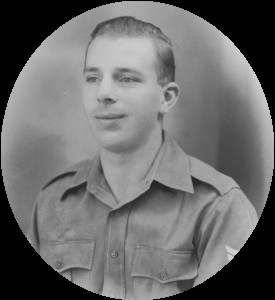|

1572431
David Arthur Day

25/10/1917 – 21/10/2009
Royal Artillery
Service Record
David joined the Royal Artillary on 17th June 1941. His initial training was at Hereford before he was moved to London and transferred to the Royal Army Ordnance Corps. From there he moved to Retford, Kilmarnock and then on to Gurock on the Clyde to complete his training. After training, he was embarked on the Empress of Japan on 07.06.1942 bound for Penang and Singapore. The ship stopped at Sierra Leone and Cape Town, where he enjoyed a five day break, before departing again to Bombay and Dewlali. From Dewlali the ship sailed for Madras then on to Penang and their final destination Singapore. En route they heard that the Prince of Wales and The Repulse had been sunk and that Penang had been taken by the Japanese so they were diverted to Port Swettenham. They never reached Port Swettenham as it too had been taken by the time they arrived but continued on to Singapore. Arriving at Singapore they were disembarked to No 7 MRC Camp.
On Friday 13th December 1942 he was embarked on the Sultan of Johore’s motor launch - The Bulmut - bound for Australia, part of a convoy of 27 small ships. The convoy split up, sailing at night and hiding up during the day amongst the many small islands in the Riouw and Lingga Archipelagos.
Singapore fell on Sunday 15th December, two days after they sailed.
On the morning of the 17th December, The Belmut was stopped by a Japanese gunboat and all on board were taken prisoner.
Japanese POW
They were taken to the small island of Banka (a tin mining island) where they stayed for a month before being taken by boat along the Musi River to Palembang.
At Palembang they were housed in a Chinese school (Chunwha) whilst a camp was built at the edge of the jungle. This took about three months and they were moved in as soon as it was finished. The camp was not far from the Docks at Palembang – here, he and the other prisoners spent the next three years until the end of the war.
One of the prisoner’s tasks was to unload the ships bringing in supplies to the Japanese army. He recalls the wooden buckets of a thick, almost solid, liquid – fermented soya from which soy sauce was made – that were unloaded. The smell was unlike anything they had ever experienced before and they could not imagine that anybody would ever eat the foul smelling stuff - but the Japanese loved it!
Next to the docks was an airport owned by KLM. The prisoners were used to extend the facilities and he recalled it was a massive complex when it was finished.
Food in the camp was rice, rice and more rice – a red rice, that was cooked in large woks (kwalis) and enhanced by whatever they could steal or purloin. From his description it would be something like Special Fried Rice or Nasi Goreng that we are familiar with today - but without any meat – and not in large quantities.
The lack of a healthy diet and hygiene meant many succumbed to serious illness and died.
Liberation
At the end of the war, Louis Mountbatten’s wife’s plane landed for a goodwill visit. She toured the camp to see what conditions were like and distributed the three years worth of Red Cross parcels the Japanese would never let them have. The following day he was embarked on a Dakota with eleven others bound for Singapore. On arrival there they were all transferred to the Alexandra Hospital where they spent the next ten days. From the hospital in Singapore they were embarked on a Sunderland flying boat bound for Gaul in Ceylon where they recuperated for about a month before leaving for Southampton aboard The Highland Monarch.
Arriving in Southampton, they had an overnight stop before boarding a train for Waterloo, where, on arrival were paid for their last three years service.
From Waterloo, it was to Liverpool Street and than on to home in Kings Lynn and on to Terrington St Clement, arriving on Saturday 10th November 1945 to be reunited with his wife Grace who he married prior to his embarkation on The Empress of Japan in 1942.
Civlian Life
On his return to civilian life he and his wife started a Nursery business in Terrington St. Clements, Norfolk growing tomatoes, vegetables, tulips and daffodils. They retired in 1978, sold the business and moved to Knodishall in Suffolk to be closer to their grandchildren. He and Grace carried on their gardening skills at Knodishall, winning many cups and trophies in the local flower and produce shows. Grace died in 2003.
Died
David died in Ipswich hospital - Debenham Ward on 21st September 2009
Age 91
|